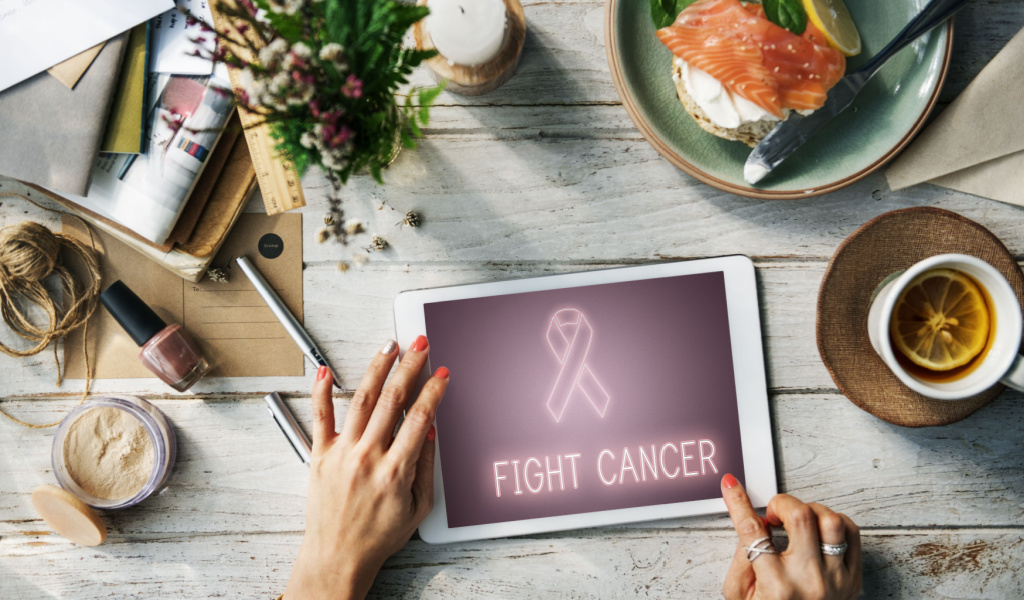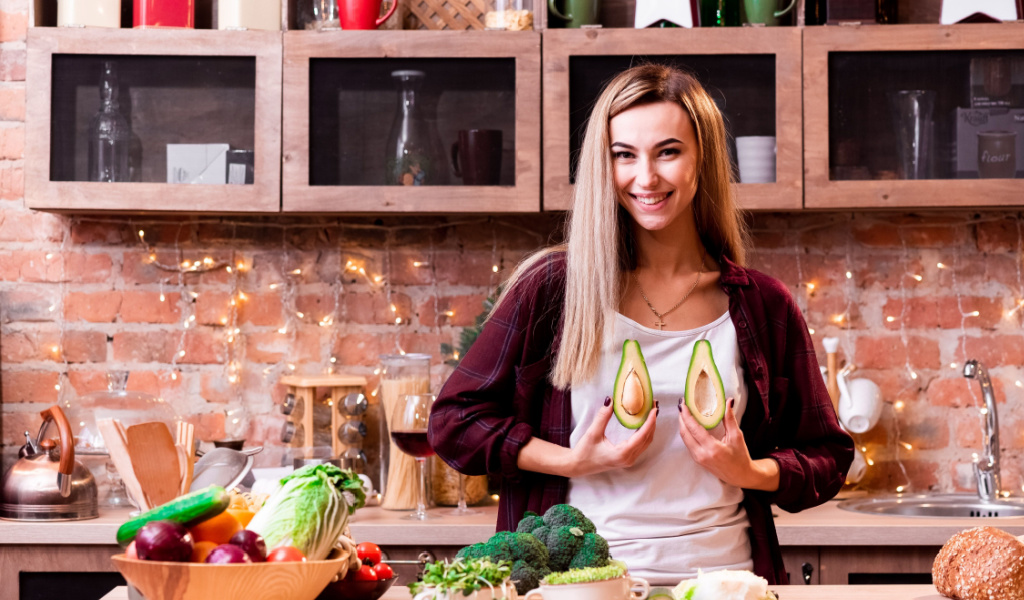Did you know that one in eight American women has the possibility of getting breast cancer over their lifetime? Although it is the most common type of cancer in women, breast cancer also affects around 1% of men. Additionally, genetic mutations and DNA damage could result in breast cancer. Inherited abnormalities associated with specific genes, such as BRCA1 and BRCA2, and obesity can also raise cancer risk.
It’s no secret that your lifestyle is vital to your health. Risk elements for breast cancer include smoking, excessive drinking, estrogen exposure, and dietary choices such as consuming large amounts of fried, sugary, or processed foods.

According to an article published in the American Society of Clinical Oncology 2015 Education Book, improving eating and exercise habits could prevent 25%- 30% of breast cancer occurrences. Studies believe that the Mediterranean diet, in particular, can help lower the risk of breast cancer. Additionally, certain food items, such as diets rich in fiber, whole grains, fruits, and vegetables, and plant-based antioxidants and phytochemicals, may work as a shield to prevent or slow the growth of this disease.
Indeed, many can agree with the saying, “Prevention is better than cure.” Thus, it is advisable to consider a healthcare expert to do routine breast cancer screenings like mammograms and manual examinations, regardless of whether you follow a nutritious diet. Indeed, the possibility of survival is significantly increased by promptly identifying and treating the disease.
Food Items to Include in Your Diet to Prevent Breast Cancer
Leafy green vegetables
Leafy green vegetables have the potential to prevent cancer. Lutein, beta-carotene, and zeaxanthin are a few of the carotenoid antioxidants present in leafy green vegetables. A lower risk of breast cancer can be linked to higher consumption of such antioxidants. Multiple studies believe consuming folate (leafy green vegetables rich in vitamin B) could prevent breast cancer. However, there is diverse proof regarding the impact of folate intake on breast cancer risk in general. Some leafy green vegetables with high folate content include spinach, arugula, kale, chard, turnip greens, Bok choy, Swiss chard, and mustard greens.
Allium Vegetables
Allium vegetables contain many nutrients, such as vitamin C, organosulfur compounds, and flavonoid antioxidants – all chock-full of cancer-fighting properties. A study that followed 660 Puerto Rican women found that substantial use of garlic and onions reduced breast cancer risk. Alliums that fall into this category include garlic, leeks, onions, scallions, shallots, and chives.
Cruciferous Vegetables
Cruciferous vegetables consist of glucosinolate substances, which your body can turn into isothiocyanate compounds, leading to a potentially lower risk of breast cancer. A study including 1,493 Southern Chinese women revealed a correlation between higher consumption of cruciferous vegetables and a lower likelihood of breast cancer. Some cruciferous vegetables with such properties include cabbage, arugula, broccoli, Bok choy, cauliflower, kale, and radish.
Citrus fruits
Citrus fruits are highly beneficial for reducing the chances of breast cancer. Compounds that could prevent breast cancer are found in citrus fruits and their peels. Moreover, anti-cancer, antioxidant, and anti-inflammatory properties are present in its nutrients, including folate, Vitamin C, flavonoid antioxidants such as quercetin, hesperidin, and naringenin, along with carotenoids such as beta-kryptoxanthin.
Moreover, research indicates that citrus fruits can lower the risk of breast cancer and numerous malignancies. High consumption of citrus can reduce the risk of breast cancer by up to 10%, as revealed in an earlier 2013 literature evaluation involving six trials and 8,393 individuals. Citrus fruits to include in your diet for breast cancer prevention include oranges, lemons, limes, tangerines, pomelos, and grapefruits.
Berries
Regular consumption of berries is highly advantageous to your health. Berries contain antioxidants, like flavonoids and anthocyanins, which could safeguard you from cellular damage and the growth and spread of cancer cells in your body. You can start including berries such as blueberries, blackberries, cranberries, strawberries, raspberries, and boysenberries in your diet to take advantage of their cancer-fighting properties.
Moreover, a 2013 study of 75,929 women revealed that increased berry consumption decreased the incidence of estrogen receptor-negative breast cancer.

Apples, Pears, Peaches & Grapes
Apples, pears, peaches, and grapes are notable because they are believed to be particularly effective in reducing the risk of breast cancer in men and women. A 2013 study found that women who consumed at least two servings of peaches per week were up to 41% less likely to develop estrogen receptor-negative breast cancer. Another 2014 study concluded that polyphenol antioxidants in peaches blocked a human breast cancer cell implanted in a laboratory animal from growing and spreading.
Fatty Fish
Fatty fish are a great addition to your diet that can help reduce the risk of breast cancer. They are a great source of cancer-fighting nutrients such as selenium, omega-3 fatty acids, and antioxidants like astaxanthin. Consuming more fatty fish, unrefined oils, and little to no processed foods can balance your omega-3 to omega-6 ratio, reducing breast cancer risk. Some types of fatty fish that you should start eating more of include kippers, sardines, anchovies, salmon, tuna, mackerel, and herring.
Fermented Foods
Probiotics and other nutrients that exist in fermented foods could protect you against breast cancer. Moreover, research on animals and in test tubes reveals that these cancer-fighting properties are linked to the probiotic’s immune-boosting properties. Some of the most common foods rich in probiotics include yogurt, miso, kimchi, sauerkraut, pickles, raw cheese, kvass, and kefir.
Beans
Beans have high levels of vitamins, minerals, and fiber, which can help protect against breast cancer. As per the results of a study involving 4,706 women, higher consumption of beans reportedly decreased the frequency of breast cancer by up to 20%. Chickpeas, black beans, peas, soya beans, lentils, peas, and kidney beans are great fiber options for your daily diet.
Plant compounds in herbs and spices could prevent breast cancer as they contain fatty acids, vitamins, and polyphenol antioxidants. Incorporating herbs and spices into your diet is a good idea since they possess anti-cancer properties. You can use spices such as turmeric, ginger, black pepper, cinnamon, oregano, thyme, parsley, and rosemary to not only add flavor to your dishes but also to take advantage of their anti-cancer properties.
Whole Grains
Vitamins, minerals, fiber, and antioxidants are merely a few of the essential nutrients found in whole grains. Additionally, they could have effective anti-cancer capabilities. A few such wholegrain foods are brown rice, wheat, quinoa, barley, and rye.
Walnuts
Walnuts are a rich source of alpha-linolenic acid and additional healthy fats – all of which come with a number of health benefits. Moreover, some studies suggest an increased intake of walnuts or any other type of nut could aid in preventing breast cancer.



